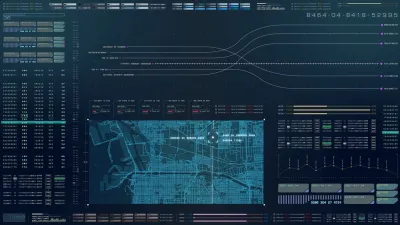Kaid Benfield says that the current trend towards "intelligent cities" is driven by large corporations, and "futuristic technology won’t fix many of our basic urban problems."
Architect Steve Mouzon dubs the movement "gizmo green": "
For example, why are we even discussing the carbon footprint of a building if it is built somewhere that requires you to drive everywhere?", writes Mouzon.
Benfield concurs:
"...I find to be dangerous the claims of some that the more trendy phrasing and theory of "intelligent cities" is beginning to displace that of now-mainstream "smart growth." Whether we call more compact and logical regional growth patterns, more accessible and efficient public transit, and more walkable neighborhood design "smart growth" or "urbanism" or something else, we still need to do it and not let ourselves be seduced into thinking that the problems are being addressed adequately or better by technology. They are not."
FULL STORY: Is there a downside to "intelligent cities" or "smart cities"?

Maui's Vacation Rental Debate Turns Ugly
Verbal attacks, misinformation campaigns and fistfights plague a high-stakes debate to convert thousands of vacation rentals into long-term housing.

Planetizen Federal Action Tracker
A weekly monitor of how Trump’s orders and actions are impacting planners and planning in America.

San Francisco Suspends Traffic Calming Amidst Record Deaths
Citing “a challenging fiscal landscape,” the city will cease the program on the heels of 42 traffic deaths, including 24 pedestrians.

Defunct Pittsburgh Power Plant to Become Residential Tower
A decommissioned steam heat plant will be redeveloped into almost 100 affordable housing units.

Trump Prompts Restructuring of Transportation Research Board in “Unprecedented Overreach”
The TRB has eliminated more than half of its committees including those focused on climate, equity, and cities.

Amtrak Rolls Out New Orleans to Alabama “Mardi Gras” Train
The new service will operate morning and evening departures between Mobile and New Orleans.
Urban Design for Planners 1: Software Tools
This six-course series explores essential urban design concepts using open source software and equips planners with the tools they need to participate fully in the urban design process.
Planning for Universal Design
Learn the tools for implementing Universal Design in planning regulations.
Heyer Gruel & Associates PA
JM Goldson LLC
Custer County Colorado
City of Camden Redevelopment Agency
City of Astoria
Transportation Research & Education Center (TREC) at Portland State University
Jefferson Parish Government
Camden Redevelopment Agency
City of Claremont





























